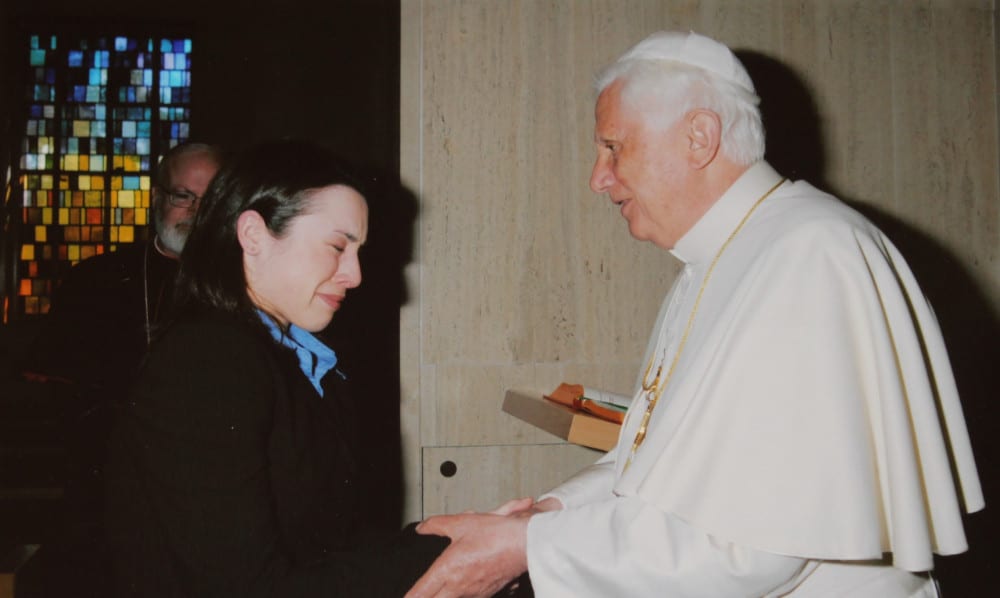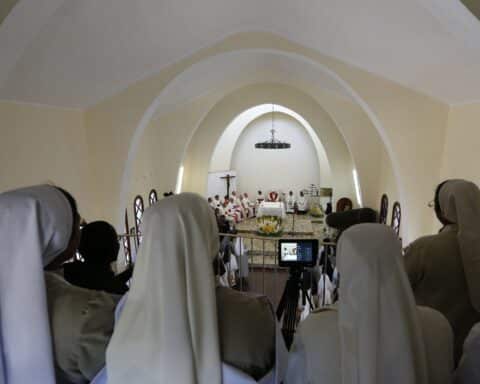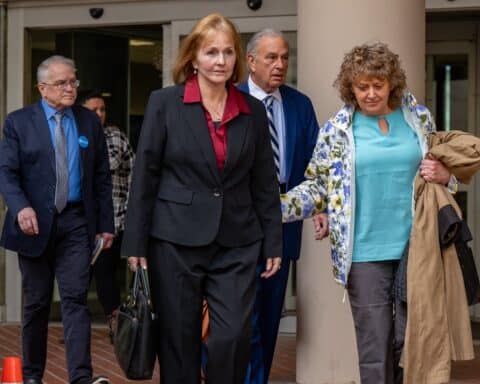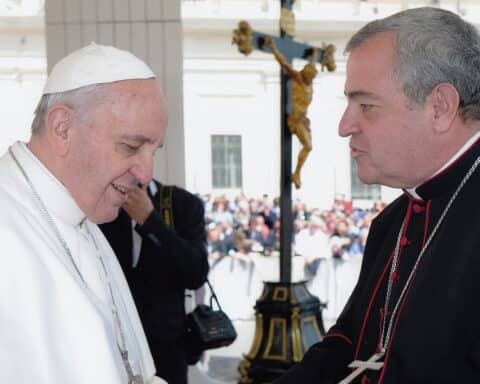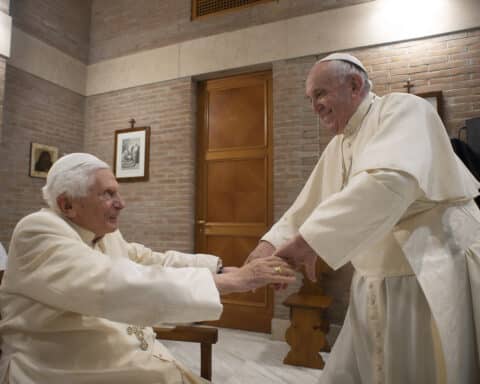This essay is part of Our Sunday Visitor’s coverage of the death of Pope Emeritus Benedict XVI, who died on Saturday, Dec. 31, at the age of 95. He served as pope from April 19, 2005, until his resignation on Feb. 28, 2013.
There’s a lot going on in the Catholic Church and in the world around us that may cause many of us to throw our hands up in frustration and maybe even despair. However, we have the assurance of God’s presence and of his promises and, much like other virtues, hope is something that we have to choose to cling to in spite of our pain and uncertainty.
There have been many times over the course of my own life when I have been on the brink of despair. I suffered months of sexual abuse at the hands of a trusted parish priest when I was 15 years old, lost my oldest brother unexpectedly due to a heart condition a year later, and have endured numerous health scares including cancer and a heart condition that nearly took my life. There have been many times when my faith has been very weak and, as a result, hope has been difficult to hold on to. That changed in April 2008 when, along with four other victims of clergy abuse from the Archdiocese of Boston, I was given the life-changing opportunity to meet with Pope Benedict XVI during his apostolic trip to the United States.
At the time of this meeting, five years had passed since a criminal trial had put my rapist behind bars. I had made leaps and bounds on my healing journey, but I was still struggling in more ways than one. A piece of advice from my mother had kept me going since a time of particular struggle and uncertainty before the trial. She encouraged me to look for God’s “glimmers of grace.” These are his little gifts to us that bring us joy, reassure us of his love and lead us to hope. Sometimes, God sends certain individuals into our lives to be glimmers of grace; for me, Pope Benedict XVI became one such glimmer.
I listened intently to Pope Benedict’s homily at a packed Washington Nationals Stadium in Washington, D.C., on April 17, 2008. He spoke of the sex abuse scandal and of hope, love, forgiveness and of keeping God’s children safe. He asked Catholics to love their priests and to affirm them, and he encouraged all to pray to the Holy Spirit for guidance and conversion. At that point in time, I had still not forgiven my rapist, and in that moment, I felt as though the Holy Father was speaking directly to me. Perhaps his words were not what I wanted to hear, but they were what I needed to hear. The closing words of his homily particularly struck me: “Those who have hope must live different lives! By your prayers, by the witness of your faith, by the fruitfulness of your charity, may you point the way toward that vast horizon of hope which God is even now opening up to his Church, and indeed to all humanity: the vision of a world reconciled and renewed in Christ Jesus, our Savior.”
Despite the good that had come into my life, hope was something that still did not come easily. Pope Benedict’s words were of great encouragement to me. I knew that choosing to live the hope-filled kind of life the pope described wasn’t going to come easy. Just as healing wasn’t going to happen overnight, neither would hope be restored overnight, but hope was possible.
Later that afternoon, as I knelt in the chapel at the apostolic nunciature preparing for the Holy Father to arrive, I struggled to think of the right words to say when my time with him came. With tears welling up in my eyes, I gave myself over to God as I prayed for the courage to say whatever needed to be said. As I recalled the pope’s words from his Mass earlier that day, there was a peaceful reassurance deep within my heart that I was not alone.
When I heard the door at the back of the room open, I turned around just as the pontiff entered. I couldn’t take my eyes off the slight, old, humble-looking man. Pope Benedict smiled as he walked toward the front of the chapel where he knelt and led us in prayer. When the Holy Father arose, Cardinal Seán P. O’Malley of Boston presented him with a large book containing the names of 1,476 known victims of abuse from the Archdiocese of Boston. Pope Benedict was visibly moved. His eyes teared up, and his face suddenly bore on it such pain and anguish that I had a sudden desire to run up to him and hug and comfort him.
Much like a war memorial, that book of names helped to humanize the victims and show the Holy Father the dimension of the abuse problem in a powerful way. I felt that he was experiencing a part of our suffering in a very unique and profound way, and for a moment, the pope looked like a man with the weight of the world on his shoulders. Written on his face was the visible pain of a man broken down by the sins of others and by the pain of those affected by that sin. He seemed particularly pained when Cardinal O’Malley explained that the little crosses next to some of the names represented individuals who had died, many by overdose or suicide. Pope Benedict said a few words to us and humbly apologized for the pain and suffering certain members of the Church had caused.
Each of us was called forward one at a time for a few moments alone with him. I still had no idea what to say, and when I was called forward, the profound “right words” that I had searched for never came. Instead, as I practically ran toward the Holy Father and reached my hands out toward his outstretched hands, I reacted in a way that a child would — with tears, the simplest, most innocent and heartfelt form of expression. My tears spoke not only for my own pain and suffering but for the pain and suffering of each and every abused individual. They spoke for the suffering endured by the families of the victims and for the suffering of the Church left reeling by the evil that had been allowed to invade it. My tears were the “words” God wished me to use.
The tears just kept coming. Pope Benedict held my hands with such love and tenderness, and in that moment, I felt the heavenly Father’s love pouring into me through the pontiff. The reality that God had always been with me even in my lowest, darkest times hit me like a lightning bolt. Despite the suffering I had endured (and was still enduring on many levels), the love of God was far greater. His love had given me the strength, courage, perseverance and hope I needed to carry my crosses. Because of his love, there would always be hope, and because of God’s great love for all mankind, I needed to forgive those who had hurt me. Only then would I experience true freedom. I needed to have faith, and I needed to live with hope! There was, I realized, so much hope to be found even in the midst of suffering. I had already experienced it firsthand, although, perhaps, I had been somewhat blind to it until that moment. All of these thoughts flooded into my heart, and I was completely overwhelmed by a newfound sense of hope. For the first time, I felt love and forgiveness for my rapist simply because he, too, was a beloved child of God. For the first time, I felt free.
The Holy Father spoke to me kindly. “I understand you are getting married soon?” he asked. I opened my tear-filled eyes and moved my gaze up to his face. My own tear-filled face was reflected in his gentle blue eyes, eyes that were also filled with tears. I nodded and smiled as I thought of my wonderful fiancé, whom I would be marrying in a month’s time. Pope Benedict went on to say, “My blessings on your marriage, your family and your future family.” He presented me with a beautiful white box imprinted with the Vatican seal that contained a pair of pearl white rosaries. As he squeezed my hands one last time, he softly said, “There is always hope. I will be praying for you.”
I left that meeting a changed woman. Although our meeting was private, Pope Benedict’s message is one that needs to be shared with everyone, certainly while the world mourns his death. There is always hope! Though many years have passed since that day, my memories of the Holy Father still bring me tremendous hope. He has positively impacted my faith on so many levels. The hope he shared with me is something I strive to pass on to my family, friends, loved ones and anyone who desires healing.
I will probably always struggle with my faith from time to time, and hope is something I still have to remind myself to choose. However, in moments when hope seems lost, I remember Pope Benedict’s words to me, “There is always hope,” and peace enters my heart. My interaction with him provided me with a glimmer of hope that I will forever hold dear to my heart. This glimmer of hope is what ultimately set me on the path to experiencing true freedom. In moments of fear or uncertainty, it is truly a gift to be able to reach into the little treasure box in our hearts and pull out those glimmers of God’s grace that have helped us to experience hope so clearly and profoundly.
I will be forever grateful to the Holy Father for the role he has played in my life, in my faith, and in my healing. I treasure the gift of his life here on earth and always will. Pope Benedict XVI has been a glimmer of God’s grace and of hope in my life and in the lives of so many others, and I pray that his message to me also reaches all of mankind: There is always hope.
Faith Hakesley is the author of “Glimmers of Grace: Moments of Peace and Healing Following Sexual Abuse” (OSV, $15.95).

